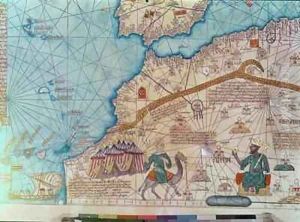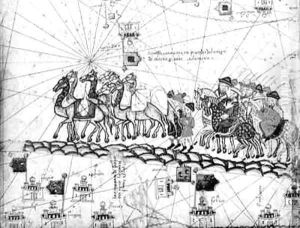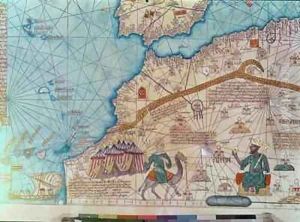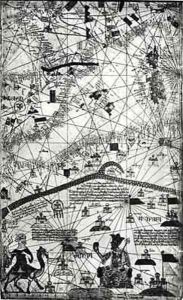Abraham Cresques Paintings
Abraham Cresques was a Jewish cartographer who lived in Palma, on the Balearic Island of Majorca, which was a hub of Mediterranean commerce and navigation during the 14th century. Majorca was part of the Crown of Aragon, and the island's cultural and commercial prosperity provided a conducive environment for the study of cartography and navigation. Cresques is often thought to have been born around 1325, although the exact date is not known.
Abraham Cresques is best known for his contribution to the Catalan Atlas of 1375, one of the most significant cartographic works of the medieval period. This atlas was a collection of six vellum leaves that together measured approximately 2 by 3 meters when unfolded. Each leaf was richly illustrated and compiled a wealth of knowledge about the geography of the known world. The atlas depicted various regions of the world, including Europe, Africa, and parts of Asia. It also provided detailed information about trade routes, cultural and political boundaries, and the locations of cities.
The Catalan Atlas was commissioned by the Aragonese court, and Cresques is believed to have created this work with the assistance of his son, Jehuda Cresques. The atlas was presented to Charles V of France, and it reflected the navigational knowledge and cosmopolitan outlook of the Mediterranean world at the time. The work of Cresques and his contemporaries influenced later cartographers and was indicative of the intellectual climate of Majorca, where Jewish and Christian scholars often worked side by side.
Cresques's work was characterized by a blend of empirical observation and classical knowledge, as well as an openness to information from various cultures, including Islamic, Jewish, and Christian sources. This made the Catalan Atlas not only a navigational tool but also a reflection of the multicultural exchange that was typical of the period.
Abraham Cresques's exact date of death is not well documented, but he is believed to have died in 1387. The legacy of his work continued through his son Jehuda and through the influence the Catalan Atlas had on later cartography. Cresques's contributions to mapmaking are an enduring testament to the rich cultural and scientific exchanges that took place in the Mediterranean during the medieval period.



